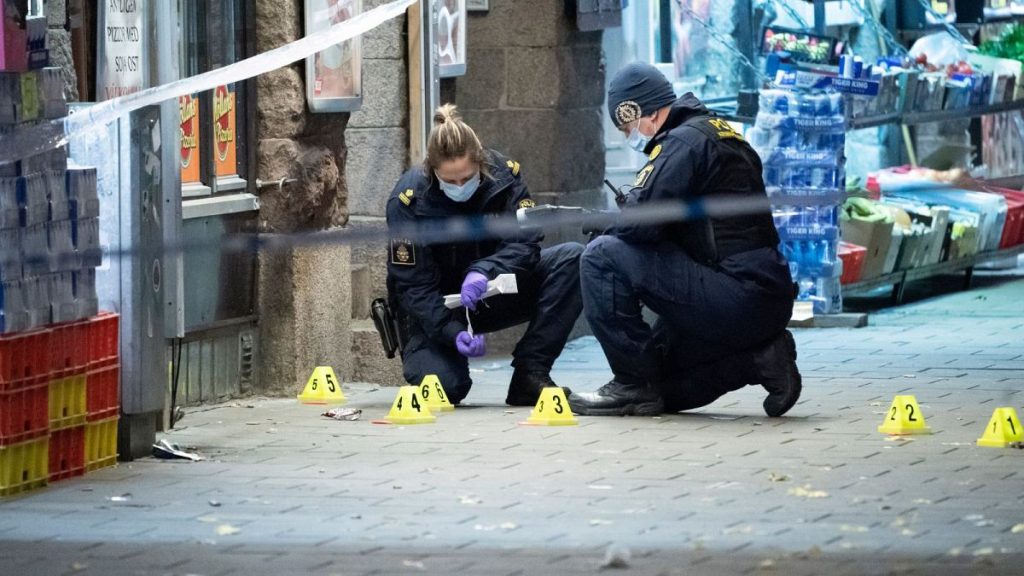Sweden has been experiencing a surge in gang-related shootings and bombings over the past year, leading to one of the highest per capita rates of gun crime in the EU. In 2023 alone, 53 people were killed in shootings, with perpetrators often being under the age of 18. This issue has spilled over into neighboring countries such as Denmark and Norway, prompting Swedish Prime Minister Ulf Kristersson to meet with Danish Prime Minister Mette Frederiksen to discuss ways to combat rising gang crime and violence. Danish officials have linked recent gang-related incidents in Copenhagen to young immigrants recruited by Swedish gangs, further highlighting the cross-border impact of Sweden’s gang violence.
The relationship between foreign policy and criminalization has become particularly evident in the context of organized crime. There is a significant overrepresentation of young men from non-Western backgrounds in criminal activities, adding to the challenges of tackling gang violence in both Sweden and Denmark. Official figures reveal that since April 2024, there have been at least 25 instances of young Swedes being hired by Danes to commit crimes in Denmark, including the use of guns, bombs, and hand grenades. In response to this threat, Denmark has announced tighter border controls with Sweden, and the Swedish government has planned to establish a cross-border police hub in Stockholm with officers from Finland, Norway, and Denmark.
The escalation of gang violence in Sweden has raised concerns not only within the country but also among its Nordic neighbors, as Swedish gangs are expanding their operations into Denmark, Norway, and Finland. In August of this year, Denmark took steps to enhance border controls with Sweden to address the threat posed by these criminal networks. Prime Minister Frederiksen emphasized the need for improved cross-border communication between local and national authorities to address the challenges posed by gang violence and support sustainable migration within the EU and the Nordic region. This collaborative approach among Nordic leaders aims to enhance coordination in tackling organized crime and ensuring the safety and security of communities across borders.
The close relationship between foreign policy and criminalization in the context of organized crime is a growing concern for countries like Sweden and Denmark, where young men from non-Western backgrounds are overrepresented in gang-related activities. The involvement of young Swedes in criminal activities in Denmark highlights the cross-border nature of gang violence and the need for coordinated efforts to address this issue on a regional level. By establishing a cross-border police hub in Stockholm and enhancing communication between authorities, Nordic leaders are taking proactive steps to combat the threat posed by criminal networks operating across borders.
The increase in gang-related incidents in Copenhagen, linked to young immigrants recruited by Swedish gangs, points to the transnational nature of gang violence in the region. By collaborating on strategies to combat rising gang crime and violence, Swedish and Danish leaders are working towards a more coordinated response to this pressing issue. Tightened border controls and the establishment of a cross-border police hub in Stockholm demonstrate the commitment of Nordic countries to address organized crime and ensure the safety and security of communities within the region. Through enhanced cross-border communication and cooperation, Nordic leaders aim to build a more sustainable approach to addressing gang violence and supporting effective migration policies in the future.
The surge in gang-related shootings and bombings in Sweden has underscored the urgent need for cross-border cooperation among Nordic countries to address the escalating violence and criminal activities in the region. By recognizing the link between foreign policy and criminalization, Swedish and Danish leaders are taking steps to combat rising gang crime and violence, which has had a significant impact on communities in both countries. Through enhanced collaboration and communication, Nordic leaders are working towards a more coordinated and effective response to organized crime, with a focus on supporting sustainable migration and ensuring the safety and security of residents across borders. By addressing the root causes of gang violence and implementing targeted strategies, Nordic countries are striving to create a safer and more secure environment for all members of their communities.


